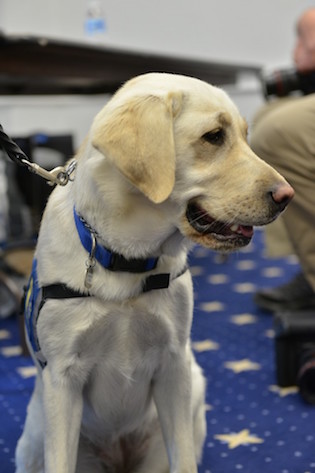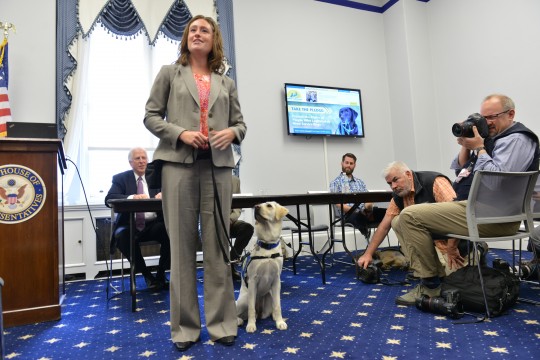Several of those involved in the Veterans Administration's study of how service dogs can be used to help treat veterans appealed on Thursday to members of Congress to expand the program.
The House Military Veterans Caucus heard from members of Canine Companions for Independence as well as a veteran and his personal service dog on the benefits of specially trained service dogs. The group was invited to Capitol Hill by Rep. Mike Thompson (D., Calif.), who supports the pilot program. He said service dogs provide a tremendous benefit to many veterans suffering from post-traumatic stress disorder.
"We must work to make sure that more veterans with post-traumatic stress are able to take advantage of the tremendous benefits service dogs provide," Thompson said in a press release. "Many thanks to everyone with Canine Companions for Independence for all they do in support of this effort and to help our veterans in need."
Stefan LeRoy, who was severely injured in 2012 while serving in the U.S. Army in Afghanistan, appeared at the event with his service dog Knoxville. LeRoy lost both his legs below the knee after stepping on an improvised explosive device as he was carrying a fellow injured soldier to a medevac helicopter.
He received Knoxville, a two-year-old yellow Labrador/golden retriever mix, as a part of his recovery.

Knoxville is trained to respond to more than 40 commands, such as opening and closing doors for LeRoy. He demonstrated some of those commands to the congressmen and staff at the meeting on Thursday.
Paul Mundell, CEO of Canine Companions for Independence, the group that trained Knoxville and is participating in the study, said that his organization went to Capitol Hill in the hopes that the study would be sped up and that the VA might even recognize the benefit of service dogs before the study ends.
"We'd like to see the VA implement some procedures to expedite enrolling subjects in the study so it's not several more years before the study is actually complete," Mun said. "Since it is taking a while we'd also like to talk to them about the recognition that veterans should have PTSD service dogs even before the study is complete because so many veterans are reliant on high doses of medications and some take their own lives. Our thought is we shouldn't wait too long."
Mundell said veterans his organizations are working with have seen a number of tangible benefits. He highlighted the case of one veteran had been housebound for over a decade due to severe PTSD but has seen a remarkable turnaround because of his dog.
"Since receiving a dog this guy is now able to go out to the store, go out to other places," he said. Other veterans have told Canine Companions that they've been able to decrease their intake of prescription medicine thanks to their involvement in the study. "We've had several veterans talk about how their reliance on medication decrease after getting a dog," Mundell said.
Mundell advocated for more veterans to receive dogs as soon as possible. He said only about 40 dogs have been adopted out so far in the program which has been active for the last three years. He blamed bureaucracy at the VA for the delay in placement.
"The researchers and clinicians who are actually conducting the study, I have every confidence that they are genuinely interested in a successful study benefiting veterans however they can. They're not the problem," Mundell told the Washington Free Beacon. "The problem really is within some of the VA hiring policies that make hiring the people necessary to implement some of the study extremely difficult and incredibly time consuming. That's where the problem lies."
The lobbying effort on behalf of expanding the VA's service dog efforts comes just a week after a house oversight subcommittee held a hearing examining the pilot program and urging the agency to expand it.
